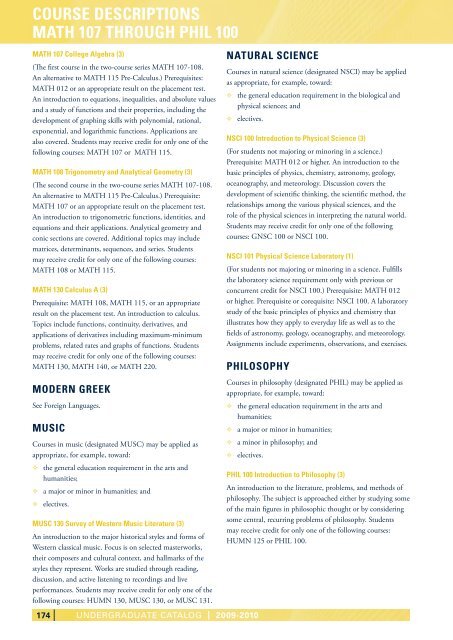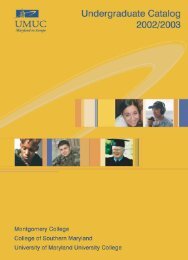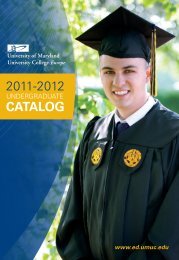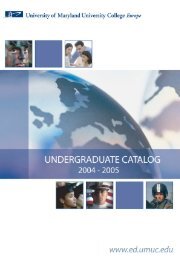UNDERGRADUATE CATALOG - UMUC Europe
UNDERGRADUATE CATALOG - UMUC Europe
UNDERGRADUATE CATALOG - UMUC Europe
Create successful ePaper yourself
Turn your PDF publications into a flip-book with our unique Google optimized e-Paper software.
CouRsE dEsCRiPtions<br />
mAtH 107 tHRougH PHil 100<br />
mAtH 107 College Algebra (3)<br />
(The first course in the two-course series MATH 107-108.<br />
An alternative to MATH 115 Pre-Calculus.) Prerequisites:<br />
MATH 012 or an appropriate result on the placement test.<br />
An introduction to equations, inequalities, and absolute values<br />
and a study of functions and their properties, including the<br />
development of graphing skills with polynomial, rational,<br />
exponential, and logarithmic functions. Applications are<br />
also covered. Students may receive credit for only one of the<br />
following courses: MATH 107 or MATH 115.<br />
mAtH 108 trigonometry and Analytical geometry (3)<br />
(The second course in the two-course series MATH 107-108.<br />
An alternative to MATH 115 Pre-Calculus.) Prerequisite:<br />
MATH 107 or an appropriate result on the placement test.<br />
An introduction to trigonometric functions, identities, and<br />
equations and their applications. Analytical geometry and<br />
conic sections are covered. Additional topics may include<br />
matrices, determinants, sequences, and series. Students<br />
may receive credit for only one of the following courses:<br />
MATH 108 or MATH 115.<br />
mAtH 130 Calculus A (3)<br />
Prerequisite: MATH 108, MATH 115, or an appropriate<br />
result on the placement test. An introduction to calculus.<br />
Topics include functions, continuity, derivatives, and<br />
applications of derivatives including maximum-minimum<br />
problems, related rates and graphs of functions. Students<br />
may receive credit for only one of the following courses:<br />
MATH 130, MATH 140, or MATH 220.<br />
modERn gREEk<br />
See Foreign Languages.<br />
musiC<br />
Courses in music (designated MUSC) may be applied as<br />
appropriate, for example, toward:<br />
G the general education requirement in the arts and<br />
humanities;<br />
G a major or minor in humanities; and<br />
G electives.<br />
musC 130 survey of Western music literature (3)<br />
An introduction to the major historical styles and forms of<br />
Western classical music. Focus is on selected masterworks,<br />
their composers and cultural context, and hallmarks of the<br />
styles they represent. Works are studied through reading,<br />
discussion, and active listening to recordings and live<br />
performances. Students may receive credit for only one of the<br />
following courses: HUMN 130, MUSC 130, or MUSC 131.<br />
174<br />
UndERGRAdUATE CATALoG | 2009-2010<br />
nAtuRAl sCiEnCE<br />
Courses in natural science (designated NSCI) may be applied<br />
as appropriate, for example, toward:<br />
G the general education requirement in the biological and<br />
physical sciences; and<br />
G electives.<br />
nsCi 100 introduction to Physical science (3)<br />
(For students not majoring or minoring in a science.)<br />
Prerequisite: MATH 012 or higher. An introduction to the<br />
basic principles of physics, chemistry, astronomy, geology,<br />
oceanography, and meteorology. Discussion covers the<br />
development of scientific thinking, the scientific method, the<br />
relationships among the various physical sciences, and the<br />
role of the physical sciences in interpreting the natural world.<br />
Students may receive credit for only one of the following<br />
courses: GNSC 100 or NSCI 100.<br />
nsCi 101 Physical science laboratory (1)<br />
(For students not majoring or minoring in a science. Fulfills<br />
the laboratory science requirement only with previous or<br />
concurrent credit for NSCI 100.) Prerequisite: MATH 012<br />
or higher. Prerequisite or corequisite: NSCI 100. A laboratory<br />
study of the basic principles of physics and chemistry that<br />
illustrates how they apply to everyday life as well as to the<br />
fields of astronomy, geology, oceanography, and meteorology.<br />
Assignments include experiments, observations, and exercises.<br />
PHilosoPHy<br />
Courses in philosophy (designated PHIL) may be applied as<br />
appropriate, for example, toward:<br />
G the general education requirement in the arts and<br />
humanities;<br />
G a major or minor in humanities;<br />
G a minor in philosophy; and<br />
G electives.<br />
PHil 100 introduction to Philosophy (3)<br />
An introduction to the literature, problems, and methods of<br />
philosophy. The subject is approached either by studying some<br />
of the main figures in philosophic thought or by considering<br />
some central, recurring problems of philosophy. Students<br />
may receive credit for only one of the following courses:<br />
HUMN 125 or PHIL 100.






